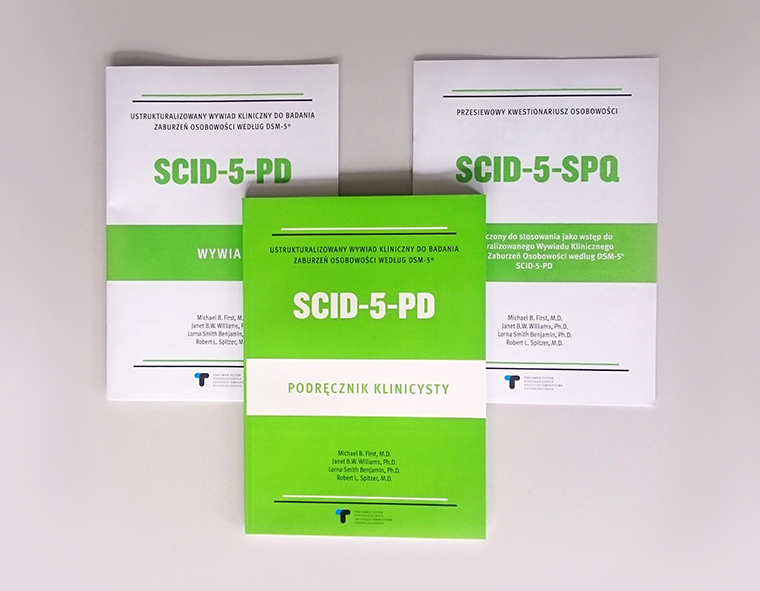The Structured Clinical Interview for DSM-5® Personality Disorders (SCID-5-PD) is a semistructured diagnostic interview for clinicians and researchers designed to assess ten personality disorders (clusters A, B and C) included in the DSM-5® as well another defined personality disorder.
- Avoidant personality disorder
- Dependent personality disorder
- Obsessive-compulsive personality disorder
- Paranoid personality disorder
- Schizotypal personality disorder
- Schizoid personality disorder
- Histrionic personality disorder
- Narcissistic personality disorder
- Borderline personality disorder
- Anti-social personality disorder
The SCID-5-PD is meant to create a good relation with the respondent. It can be applied to identify personality disorders and to make both categorial (present/not present) and profile diagnosis
The SCID-5-PD is an updated version of the Structured Clinical Interview for DSM-IV Axis II Disorders (SCID-II). Its name SCID-5-PD reflects the absence of axis division within the DSM-5®. Although the DSM-IV criteria were not changed in the DSM-5®, the SCID-5-PD items underwent careful review and modification in order to grasp in the best possible way constructs described in the diagnostic criteria. The possibility of making the profile diagnosis is also an important addition in the SCID-5-PD.
The SCID-5-PD includes the Screening Personality Questionnaire SCID-5-SPQ which is a useful self-rating tool for patients or respondents. The SCID-5-SPQ can be applied for screening purposes; its administration takes approx. 20 min. and helps to reduce time of the interview.
The SCID-5-PD will be a valuable tool, helping clinicians and researchers to more precisely diagnose various personality disorders.
Usually the full-length interview is conducted but a clinician or researcher can decide to conduct only those parts of it which refer to disorders s/he finds important.
Materials:
- Kit (manual, 10 interview sheets, 10 screening questionnaires SCID-5-SPQ)
- Manual
- Interview sheets
- Screening questionnaires SCID-5-SPQ

The interview is administered by a clinician (psychologist or physician) or another mental health professional familiar with DSM-5 classification and diagnostic criteria (American Psychiatric Association, 2013; Polish editions 2015 and 2018).
Target population
Examinees may include psychotherapy patients, individuals undergoing psychiatric treatment, or those treated for other conditions. It may also include non-patient individuals, such as participants in epidemiological studies on the prevalence of personality disorders.
Supplementing interviews with other sources of information
Often, the sole source of information is the interview with a patient. However, when assessing the interview's findings, additional sources of information (such as observations from past or current therapists, partners, or family) can be valuable. Supplementary information is particularly useful in assessing personality disorders since affected individuals may lack insight into their difficulties or downplay their impact on functioning.
Combining SCID-5-PD with SCID-5-CV
If there is reason to suspect that current symptoms are not stable personality traits (e.g., they have intensified recently), appropriate modules of SCID-5-CV (Structured Clinical Interview for DSM-5 Disorders) should be conducted to evaluate other mental disorders. In research settings, investigators may also choose to administer SCID-5-CV before SCID-5-PD in certain cases.
SCID-5-PD can be used in:
- Clinical settings: For psychotherapy patients, psychiatrically treated patients, or hospitalized patients receiving somatic treatment who report psychiatric symptoms
- Forensic contexts
- Recruitment contexts: To assess candidates for challenging and high-risk professions where mental health is a criterion for job fitness
- Epidemiological studies: Diagnostic data from SCID-5 can be used by researchers, practitioners, policymakers, and the public to examine the prevalence and incidence of mental disorders in specific populations
- Research projects
- Educational purposes: To train mental health students, including those in medicine, psychology, nursing, and psychiatric social care, in interviewing skills. SCID-5-PD includes many useful questions for eliciting diagnostic information from patients.
Uprawnienia do zakupu i stosowania danego testu zależą od jego kategorii, wyznaczonej zgodnie z kategoryzacją Komisji do Spraw Testów Psychologicznych działającej z ramienia Polskiego Towarzystwa Psychologicznego.
SCID-5-PD jest narzędziem kategorii A.
A – testy dla psychologów; dla innych specjalistów
Wymagane kwalifikacje:
- Ukończone studia magisterskie z psychologii – wymagane przedłożenie kopii dyplomu
LUB
- Ukończone dowolne studia wyższe magisterskie – wymagane przedłożenie kopii dyplomu
- ORAZ praca z ludźmi w obszarze zawodowym, który stanowi uzasadnienie dla wyboru i stosowania narzędzia.



